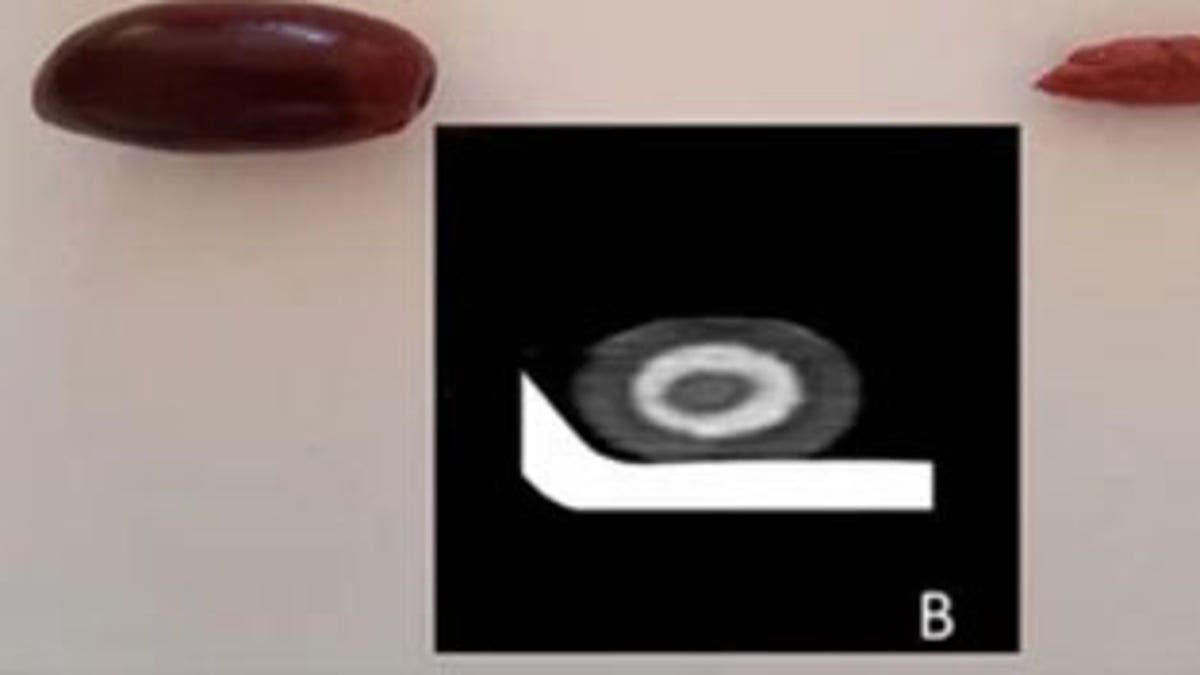
An olive and its pit; the inset image is a scan of a single black olive, which is similar in appearance to the olive in the man's gut. (BMJ)
When a 24-year-old man in Belgium went to the hospital because he had belly pain, doctors found an olive stuck in his small intestine — and soon after, diagnosed him with Crohn's disease.
The man had sudden and severe abdominal pain for two days before he went to the doctor, according to a report of the man's case, published Aug. 9 in the journal BMJ Case Reports. The incident took place about six months ago.
The doctors performed a CT scan of the man's abdomen to see if they could spot the reason for his pain. They found that a portion of the wall of the small intestine was thickened, and within that thickened tissue, they discovered an odd-looking spot that turned out to be a black olive.
MOM OF DOG ATTACK VICTIM SUFFERS FATAL STROKE AT DOCTOR'S APPOINTMENT
Olives were one of the man's favorite foods, and he had accidentally swallowed the olive whole, pit included, said lead author Dr. Halil Yildiz, an internal-medicine physician at University Hospital Saint-Luc in Belgium who treated the man.
To confirm that the spot on the scan was an olive, however, the doctors did something that had never been done: They performed another CT scan — a scan of a single fresh olive. "This is the first time that CT acquisition of a fresh olive has been compared with patient images," the doctors wrote in the report.
The olive scan did its part: It confirmed that the small fruit really was lodged in the man's bowels, Yildiz told Live Science.
No surgery was required to remove the olive; instead, the man was given steroids to reduce the inflammation in his gut, and eventually, the olive passed out of his body in his feces, Yildiz said.
In most cases when a person swallows a "foreign body" — in other words, something they shouldn’t have swallowed — it passes safely through the gastrointestinal tract and out the other end, according to the report. Occasionally, something may get stuck, but "this complication is very rare with olives," the authors wrote.
13-YEAR-OLD HAD FATAL DOSE OF HEROIN, FENTANYL IN SYSTEM, AUTOPSY REVEALS
Indeed, it turns out that there was another factor at play that made it much more likely for the olive to get stuck in the man's gut, Yildiz said: He had a type of inflammatory bowel disease called Crohn's disease.
But neither the man nor the doctors knew that the patient had Crohn's disease until after the olive had passed out of his body and the patient returned for a follow-up colonoscopy, according to the report. It was during that exam that the doctors diagnosed the man with Crohn's disease.
"If there was no bowel disease," the olive wouldn't have caused a problem, Yildiz said. "Crohn's disease [made] the obstruction more likely."
Originally published on Live Science.








































